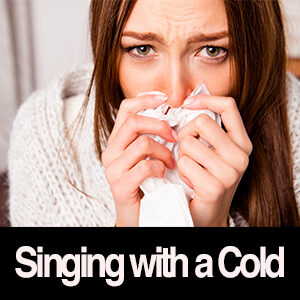Singing with a cold or sore throat
 Singing with a cold or sore throat
Singing with a cold or sore throat
I often get asked, should I sing with a cold or sore throat (or perhaps both!). The answer is simply NO – It’s not a good idea. You may not be happy with this answer, the reasons for which I will discuss below. However you must weigh up the importance of your gig against feeling worse or the possibility of damage to your voice.
Why should I not sing with a cold or sore throat?
1. You are not going to feel 100% well, apart from feeling low and bunged up, your body is having to fight an infection. Give yourself a rest to help your body recover
2. Voice strain. Singing with a sore throat, excessive coughing or clearing your throat is going to make your vocal cords swollen and sore, causing a hoarse voice or loss of voice, which could possibly lead to:
3. Nodules. Vocal nodules are basically callouses on your vocal cords, caused by poor technique, over-straining your vocal cords. Diagnosed by a camera looking at your vocal cords, You will need complete vocal rest if these occur.
If you simply cannot get out of your audition or gig and are going to perform with a cold or sore throat, I’ve listed some tips to help you get through:
1. Drink plenty of water. Sounds obvious, if your hydrated fully then your body will be less prone to the extra stress of a cold or sore throat. Keep alcohol, caffeine or milky drinks to a minimum. Herbal Teas may help or you can also make your own brew of Honey, Lemon and Grated Ginger into a mug of boiling water.
2. Use a throat spray or lozenges. Make use of available throat sprays or throat lozenges whichever suits you best. Your pharmacist or doctor will be able to advice you on over-the-counter remedies available to you.
3. De-congest the nasal passages. Try regular steam inhalations with a couple of drops of eucalyptus, lavender or tea tree essential oils. Please consult a health professional first, especially if you have a medical condition or pregnant. Your local pharmacist can advice you on a good Decongestant if you needed something stronger
4. Reduce the time singing. Can you cut back on the number of songs in your set. Play extra background music or talk more rather than sing? See if can encourage a friend/band mate to help you sing or introduce the songs? Do you know another singer that you could introduce into the performance . eg. someone who’s first starting out and you letting the audience know this. Often the audience will be favourable to this. Restrict the encore to one song? Can you change your set so that you drop out the really hard or challenging vocals in a certain song? If you switch it for a less demanding song on your voice will your audience really notice?
5. Turn up the Mic and sing at a lower volume. If you are using a PA system, get this to carry more of the weight, rather than your voice. Turn your music/band mates down a little, and turn up your microphone. Position your speakers to minimize the effect of feedback. Not singing so loudly may help preserve your voice.
6. Reduce the Physical effort. Remember singing is quite energetic and demanding on your body. So think about the amount of time on stage and how much movement you do during your act. Make sure as with point 1. that you are fully hydrated,
7 Give yourself a break. You’ve done your gig, now look after yourself and give your voice a complete break for a few days until you recover
If symptoms continue, please seek advice from your own Doctor.


